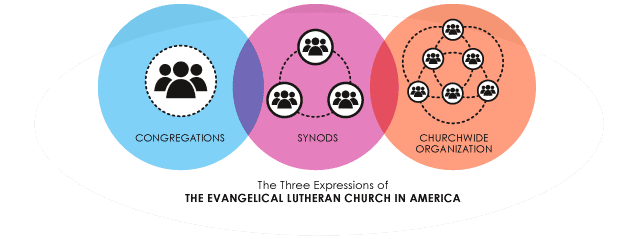 Lay Leaders Have An Important Job
Lay Leaders Have An Important Job
…if the Church Will Let Us Do It!
The governance of the Evangelical Lutheran Church is murky water. We are proud of our interdependence—our three expressions. Church leaders talk about it a lot.
We are less clear on how this actually works.
The foundation of interdependence is the local congregation. From this foundation comes the talent and resources that support the second interdependent entity (the regional body or synod) and the third interdependent agency (the national church). Entities 2 and 3 cannot exist without Entity 1. Entity 1 can exist without the others, but relationship with 2 and 3 is expected to make the local church stronger and more effective.
Regional clergy often feel a loyalty to the third expression, the National Church. Are they part of the regional expression? Are they a branch of the national expression? Are they beholding to their regional leader? Are they most loyal to the leaders and congregation who issue their call?
There is spillover in the role of the regional leadership—especially the office of bishop. They are elected by and serve the regional churches, but they are close to the national expression. A sort of old boys’ and girls’ club. They know each other and regard each other, but have no clue what they as individuals are doing in their 65 little corners of the United States. Since the highest authority in the ELCA is the regional Synod Assembly, they never find out. At some point the ELCA should review this. It is proving to be a bad idea. Leaders are taking advantage of this weaknesses for their own enrichment.
Lay leaders don’t fit into this structure except on paper. Our constitutions provide the laity considerable control over local ministry—the first of the three expressions and the one that funds the other two!
In practice, regional bodies are taking on powers to unilaterally strip local authority at whim. There is no effective way to check this. Synod Assemblies get their information from the synod office. They don’t have any way of investigating issues independently. In our Region, they haven’t even tried. Their decision in our case was based primarily on gossip—generated by SEPA leaders.
But still, the management of the local congregation is in the hands of the lay people. That’s the way it’s supposed to be in Lutheranland. Lay leaders stand between the people in the pew and the long arms of the clergy which branch from the national expression.
Here’s a quote from management guru Seth Godin.
The work of the middleman is to inspect and recover. If your restaurant gets lousy fish from the boat, you don’t get to serve it and proclaim garbage in garbage out. No, your job is to inspect what you get, and if necessary, change it.
That’s a big responsibilty. When we get lousy guidance from the regional or national office, we have an obligation to say “Wait a minute.”
Lay people must constantly inspect the information passed down to them—double check it, so to speak. We cannot trust that clergy have our interests in mind. It’s been clear in far too many cases that they have their own interests or the regional body’s interests in mind.
Many lay people individually are more than qualified to ask the right questions. Some lay people need to learn these skills. A responsibility of lay people is to make sure their congregations foster these skills among future generations.
Fostering an environment where questions are expected and encouraged is a challenge. Management is always tempted to believe that things run most smoothly when there are no challenges. They are wrong. Challenges, ably and readily met, make a wonderfully creative environment. We have a way to go before we achieve this.
It doesn’t take much for wrong teaching to take hold and change the character of the whole church.
Our Ambassadors occasionally come across such wrong teaching. One pastor preached to the people that they shouldn’t turn to God in prayer for little things that they can do themselves. Save God for the big things, she preached.
That began to resonate but it isn’t scriptural. It sure sounds good. But it is wrong. God is God. He wants us to come to Him in prayer. Our biggest problems are a hangnail to Him. It is somewhat presumptuous to believe that we have ANY power that is not gifted to us through Him. We need to stay in touch with God so that we remember that!
Wrong thinking can spread to wrong acting. We are seeing this today in the mis-interpretation of powers.
Bishops, aided by their synod councils, who together face economically trying times, look for answers. The answers they are finding are often outside their governance. If there is no one to point this out, they can help themselves at severe harm to others and their own mission. Get away with it once, the second, third and fourth times are so much easier—even acceptable for the lack of challenge.
What do we, as part of an interdependent church, do when one interdependent expression becomes predatory against another interdependent expression?
The only thing that can stop this is knowledgeable and independent thinking among both clergy and lay people.
That’s the challenge of today’s church.
We’ve been to Synod Assembly. We’ve seen pastors walk in, register as required, and walk out, leaving the decisions to others to make — right or wrong.
We’ve been to Synod Assembly where no one asks questions. No reason to. The answers have been laid out for the Assembly to rubber stamp.
We’ve been to Synod Assembly where serious and costly mistakes have been made because delegates follow when they should be leading.
The work of the middleman (lay leadership) is to inspect and recover. It’s a big job but somebody’s got to do it.
It’s actually the laity’s constitutional role. It’s supposed to be shared with clergy, but that hasn’t been effective. They need their jobs!
Let’s start doing a better job. It may be tough at first. It certainly hasn’t been easy here in East Falls, where the dangers and pitfalls are on display for all churches to see. (You’re welcome!)
If we don’t do our job under the grand scheme of Lutheran interdependence, it will all fall apart. Laity are Lutheran inspectors—the best safeguard to—
“Garbage in. Garbage out.”

